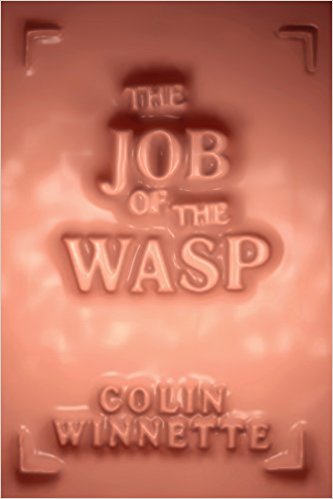
There is something bizarre and unsettling at the core of Colin Winnette’s oeuvre, and whatever magical thing that is, it displays its power like the tail of a peacock in his latest, The Job of the Wasp. Released by Soft Skull Press, an indie press that ranks amongst my favorites, The Job of the Wasp is what would happen if William Golding’s Lord of the Flies crashed against Guillermo del Toro’s The Devil’s Backbone at high speed in a room full of pulp magazines where Kinji Fukasaku was trying to rewrite Battle Royale as a Gothic ghost story.
The Job of the Wasp is narrated by a boy who has just arrived at an isolated school for orphaned boys. At first, the cold welcoming and the attitude he gets from the headmaster worry him, but he quickly realizes that there is much more to be concerned about. Between the accusations that come his way and the constant hostility toward him from his cohorts, it soon becomes clear that there is something very wrong going on at the orphanage. Strange whispers float in the night, violence seems to be the underlying sentiment in all interactions, and the headmaster appears to be focused on him. As the new boy learns to navigate his new inimical surroundings, he starts to unravel the mystery gives the school it’s unwelcoming atmosphere, and a series of unfortunate accidents and encounters start to add a few bodies to his already large stack of problems.
Between the creepy, claustrophobic atmosphere, strange children, collection of secrets, hidden agendas, constant hostility, and explosions of violence, there is a lot to enjoy in this novel. However, the crowning jewel of this narrative is that it inhabits two spaces at once. There’s the orphanage and the events that happen in it, and then there’s the narrator’s mind and constant inner monologue. The analyzing, questioning, deciphering, and plotting are wonderfully detailed, and they make for some truly engaging reading. There is always something new to uncover, some new possibility that has hitherto been ignored, some action that hides a secret meaning and that is probably part of a larger plot.
While balancing these two spaces is tricky, Winnette pulls it off brilliantly. Every paragraph is affected by both, and the writing itself is a mixture of Gothic mayhem and literary fiction that flirts with horror and mystery:
“My spirits had split with my pant leg. The energy provided by my victory over Nick had carried me here, but I now sat on the bricks of the walkway under the trellis, somehow feeling defeated. I turned to face the lake, and when the lightning finally came, I could see the water in the distance like a fat black pit. Was this what life was like for everyone else in the world, or only what had been prepared for me? I knew the other boys, however innocent, would be caught up in all of this soon enough, and I saw in that plain fact how little control I had over the way things went. Most things, at least. The important things. In that moment, the events of my life seemed nothing more than a series of random occurrences, the majority of which were in opposition to my desires, hopes, and plans. I broke a bit of ivy from its support and threw it toward the rain. The wind picked it up and hurled it back at me, which only confirms my theory.”
There is something about Winnette’s ability to place the reader in his world that merits mentioning. Unfortunately, besides saying his descriptions are simultaneously rich and short, there is nothing else I can say because the immersion is inherent in his voice. When he writes, you are forced to read in a rhythm he dictates and absorbed by the storytelling. The result is a creepy novel because every sound and whisper can be heard, every hidden agenda is a threat that hangs in the air, and every minute spent in a storm in an inhospitable building is an oppressive experience. In that way, The Job of the Wasp is not only read; it is experienced.
Colin Winnette possesses a peculiar, off-center voice that helps him deliver uncanny narratives effectively. He’s like William Faulkner filtered through Poe and sprinkled with a bizarro version of Flannery O’Connor. If you like strange, harsh, disturbing literature, The Job of the Wasp is not to be missed.
***
The Job of the Wasp
by Colin Winnette
Soft Skull Press; 208 p.
Follow Vol. 1 Brooklyn on Twitter, Facebook, and sign up for our mailing list.
